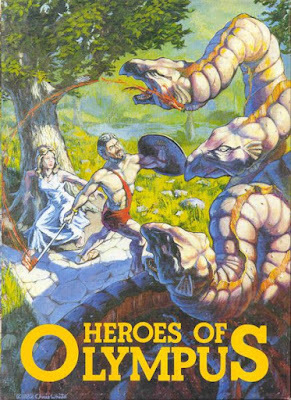Retrospective: Heroes of Olympus
 In the nearly half-century since the publication of Dungeons & Dragons, a great many roleplaying games have followed in its wake. Odds are good that you probably haven't heard of most of them, let alone had the chance to play them. That's certainly true in my case, for lots of reasons, including the youthful TSR fanboyism that limited my field of vision for too long. Consequently, I regularly encounter RPGs of which I'd never heard previously and that represent a part of the hobby's history that is otherwise obscure to me.
In the nearly half-century since the publication of Dungeons & Dragons, a great many roleplaying games have followed in its wake. Odds are good that you probably haven't heard of most of them, let alone had the chance to play them. That's certainly true in my case, for lots of reasons, including the youthful TSR fanboyism that limited my field of vision for too long. Consequently, I regularly encounter RPGs of which I'd never heard previously and that represent a part of the hobby's history that is otherwise obscure to me.Heroes of Olympus was completely unknown to me until very recently. Written by Dennis Sustare – author of Bunnies & Burrows and Swordbearer, as well as originator of the druid as a playable character class – and produced by Task Force Games in 1981, Heroes of Olympus, as its name suggests, is a roleplaying game steeped in the mythology of ancient Greece. That's a subject that's received far less attention than one might have expected, given the importance of those legends not just to Western culture as a whole but to popular adventure fiction (including RPGs).
A couple of months ago, a friend of mine indicated that he had long wanted to play this game and offered to start up a campaign, if a few other mutual friends and I were willing to participate. I was initially reluctant, to be sure, mostly due to the fact that I already participate in quite a few other roleplaying game campaigns and wasn't sure I could justify another. At the same time, I was very intrigued, both by the subject matter of Heroes of Olympus and aspects of its design. Having now played in it since late last year, I'm glad I set aside my reservations and did so.
Heroes of Olympus is explicitly modeled on the stories of Jason and the Argonauts, which are probably as close to RPG-style adventures as you can find in Greek myth. Character generation includes both random and point-buy elements, starting with one's ancestry, which is random. Most Heroes of Olympus player characters will be the sons of gods/mythological beings (e.g. nymphs) and/or royalty of one of the petty kingdoms that dot the eastern Mediterranean. For example, my own character is Eurymachos, son of King Autolykos of Imbros and the Muse Euterpe. Players allocate points among combat skills (sword, club, wrestling, etc.), physical attributes (great strength, excellent vision, etc.), and other skills (seamanship, riding, etc.). Game mechanics largely rely on percentile dice rolls, hence skills are rated 1–100.
As one might expect of a Greek-themed RPG, Heroes of Olympus involves lots of maritime travel between the lands of Greece and Asia Minor and the myriad islands of the region. Having a galley, as my character does, is thus a huge benefit, since it makes traveling from place to place easier. The general "time period" of the game is the immediate aftermath of the Trojan War, with the heroes doing great deeds during this tumultuous era. Many of those deeds involve fighting, which explains why the game includes three different combat systems, one of which covers naval battles. The other two cover duels between individuals and battles between heroes and "normal" men. These systems involve the allocation of points between attack, defense, initiative, and trickery (special maneuvers). It took me quite a while to wrap my head around the way these systems work, but, once I did, things ran more smoothly. They're still a little clunky and even tedious at times, especially when compared to simpler systems like those in D&D, but there's nevertheless a certain fun to be had in the way they handle battles.
Magic does exist in the game, though it seems mostly to be of divine origin. This makes sense, if one looks to the source material, where Greek heroes rarely rely on sorcery to achieve their ends. Still, a character favored by Hecate or Hermes might gain access to spells (as is the case for one of the PCs in the campaign in which I'm playing). Much more information is given about the gods themselves, as well as the various sorts of mythical beings one might encounter. It's all useful stuff, if limited in its scope. I imagine Sustare assumed referees and players alike could easily seek out information on Greek mythology to create their own material.
No one should forget that Heroes of Olympus is more than four decades old. This is not a modern RPG on almost any score and, even by the standards of the time in which it was written, it's, by turns, unclear, incomplete, and occasionally contradictory. Yet, it's also a great deal of fun – or at least that's been my experience. The Greek myths are a primal fount of adventure stories. Having the opportunity to play in that particular sandbox is a blast, even with a game whose rules are not always up to the task. I'd never argue that Heroes of Olympus is a lost classic of roleplaying game design, but it's got a lot to like about it, not least being the way it uses its ancient Greek inspirations as the basis for engaging sword-and-sandal exploits in a world full of gods and monsters. I wish I'd known about it sooner.
James Maliszewski's Blog
- James Maliszewski's profile
- 3 followers



